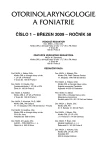-
Medical journals
- Career
Velo-pharyngeal Occlusion in Endoscopic Picture (1st part – theoretical introduction)
Authors: L. Lavička; P. Horník
Authors‘ workplace: Klinika dětské ORL LF MU a FN, Brno přednosta prof. MUDr. I. Šlapák, CSc.
Published in: Otorinolaryngol Foniatr, 58, 2009, No. 1, pp. 33-38.
Category: Comprehensive Reports
Overview
The cause of hyperrhiophonia or velopharyngeal insufficiency was described a long time ago. It still causes examination problems in minimal cleft palate defects, after operation of cleft palate, effects of pharyngeal and palatal tonsils and, especially, in differentiation of functional and organic causes. The evaluation of velopharyngeal occlusion from oral cavity is not optimal for the necessary evaluation of articulation and the type of occlusion (valve type, sphincter type, circular, with Passavant’s bar, velotonsillar, velo adenoid). One of methods use all over the world is the nasal endoscopy examination of velo pharyngeal occlusion. Tne aim of this communication is to summarize the present knowledge of application of the method and introduction practical examples.
Key words:
nasal pharyngoscopy, velopharyngeal insufficiency, hyperrhinophonia, cleaft palate.
Sources
1. Brunner, M., Stellzig-Eisenhauer, A., Proschel, U., Verres, R., Komposch, G.: The effect of nasopharyngoscopic biofeedback in patients with cleft palate and velo-pharyngeal dysfunction. Cleft Palate-craniofac J., 42, 2005, s. 649-657.
2. Brunner, M., Stellzig, A., Decker, W., Strate, B., Komposch, G., Wirth, G., Verres, R.: Video-feedback therapy with the flexible nasopharyngoscope. The potentials for modifying velopharyngeal closure and phonation. deficiencies in cleft patiens. Fortschr. Kieferorthop., 55, 1994, s. 197-201.
3. Dalston, R. M., Marsh, J. L., Vig, K., Witzel, M. A., Bumsted, R. M.: Minimal standards for reporting the results of surgery on patiens with cleft lip, cleft palate, or both: a proposal. Cleft Palate Journal, 25, 1988, s. 3-7.
4. D`Antonio, L. L., Achauer, B. M., Vander Kam, V. M.: Result of a survey of cleft palate teams concerning the use of nasoendoscopy. Cleft Palate-craniofacial Journal, 30, 1993, s. 35-39.
5. Golding-Kushner, K. J.: Standardization for the reporting of nasopharyngoscopy and multiview videofluoroscopy: A report from an international working group. Cleft Palate Journal, 27, 1990, s. 347-348.
6. Henningsson, G., Isberg, A.: Comparison between multiview videofluoroscopy and nasoendoscopy of velopharyngeal movements. Cleft Palate-craniofacial Journal, 28, 1991, s. 417-418.
7. Isberg, A. M., Henningsson, G. E.: Intraindividual change in the occurrence of Passavant`s ridge due to change in velopharyngeal sphincter function: A videofluoroscopic study. Cleft Palate Journal, 27, 1990, s. 255-257.
8. Muntz, H.: Navigation of the nose with flexible fiberoptic endoscopy. Cleft Palate-craniofacial Journal, 29, 1992, s. 507-510.
9. Muntz, H.: The use of two instrumental techniques in the evaluation of speech disorders in children. Insights, 2, 1987, s. 1-5.
10. Pigot, R. W.: The nasoendospoic appearance of the normal palato-pharyngeal valve. Plast Reconstr. Surg., 43, 1969, s. 19-24.
11. Seeman, M.: Poruchy dětské řeči. SZdN, Praha, 1955, s. 265.
12. Sommerland, B. C., Mehendale, F. V., Biích, M. J., Dell, D., Hattee, C., Harland, K.: Palate re-repair revisited. Cleft Palate–craniofacial Journal, 39, 2002, s. 295-307.
13. Škodová, E., Jedlička, I. a kol.: Klinická logopedie. Portál, Praha, 2003.
14. Ohradník, M.: Poruchy řečové komunikace u velofaryngeální insuficience. Scriptorium, Praha, 2001.
15. Witzel, M. A., Tobe, J., Walter, K.: The use of nasopharyngoscopy biofeedback therapy in the correction of inconsistent velopharyngeal closure. International Journal of Pediatric Otorhinolaryngology, 15, 1988, s. 137-142.
16. Witzel, M. A., Tobe, J., Walter, K. E.: The use of videonasopharyngoscopy for biofeedback therapy in adults after pharyngeal flap surgery. Cleft Palate Journal, 26, 1989, s. 129-135.
17. Ysunza, A., Pamplona, M., Femat, T., Mayer, I., Garcia-Velasco, M.: Videonasopharyngoscopy as an instrument for visual biofeedback during speech in cleft palate patients. International Journal of Pediatric Otorhinolaryngology, 41, 1997, s. 291-298.
Labels
Audiology Paediatric ENT ENT (Otorhinolaryngology)
Article was published inOtorhinolaryngology and Phoniatrics

2009 Issue 1-
All articles in this issue
- Risk Factors and Prognostic Importance of Complications after Total Laryngectomy
- Minimal Retrosigmoidal Approach with Applied Endoscopy
- Surgical Treatment of Alar Insufficiency by Means of Rotation of Lateral Ramus of Alar Cartilage
- Dependence of the Amount of Cerumen on Anatomical Conditions in the Ear Canal
- Possibilities in the Therapy of Sudden Hearing Disorders
- Velo-pharyngeal Occlusion in Endoscopic Picture (1st part – theoretical introduction)
- Cholesteatoma of Eardrum Membrane: Congenital or Acquired?
- Pilomatricoma – Possible Cause of Swelling in the ORL Area
- Otorhinolaryngology and Phoniatrics
- Journal archive
- Current issue
- Online only
- About the journal
Most read in this issue- Pilomatricoma – Possible Cause of Swelling in the ORL Area
- Possibilities in the Therapy of Sudden Hearing Disorders
- Velo-pharyngeal Occlusion in Endoscopic Picture (1st part – theoretical introduction)
- Cholesteatoma of Eardrum Membrane: Congenital or Acquired?
Login#ADS_BOTTOM_SCRIPTS#Forgotten passwordEnter the email address that you registered with. We will send you instructions on how to set a new password.
- Career

